CIRCULAR EXCHANGE 2024 COMMUNIQUÉ
Communiqué on the Circular Exchange 2024 Event held on February 1st at Four Points by Sheraton, Lagos.
Introduction
The Circular Exchange event is an annual gathering facilitated by the Circular Lagos and Circular Business Platform. Its inaugural edition took place in 2022, and this year marks the second occurrence, held on February 1st at Four Points by Sheraton, Lagos. Themed “Reflect. Learn. Build.” Circular Exchange 2024 was a one-day event designed to bring together stakeholders from various sectors including the Lagos State government and its agencies, regulatory bodies, legal entities, private companies, the media, circular-driven businesses, and individuals involved in the circular economy. The event aimed to foster collaboration and idea exchange to raise awareness about the sector’s inherent value and inspire innovators to explore its potential.
Circular Exchange 2024 featured several components, including an Ecosystem Report, a Panel Discussion, a Circular Marketplace Exhibition, and Learning Sessions. These elements provided attendees with valuable insights, and opportunities to engage with circular initiatives and businesses, furthering the event’s mission to promote sustainability and innovation within the circular economy.



Goodwill Speech
Goodwill messages were delivered by Esiri Agbeyi, Board Chairman, Circular Business Platform (CBP); Opeyemi Oriniowo, Policy Advisor CBP, Consul General of the Netherlands; Nneka Okekearu, Director of the Enterprise Development Centre, Pan-Atlantic University; and Titi Oshodi, the Special Adviser to the Lagos State Governor on Climate Change and Circular Economy (OCCE), Dr. Natalie Beinisch, Executive Secretary of the Circular Business Platform highlighted the aim of the circular exchange event which was to: 1) stimulate conversations and networks across different economic sectors for discussing practical solutions to propel the Nigerian circular economy forward; and 2) emphasise circular procurement. This emphasis aims to encourage individuals, organisations, or parastatals to purchase circular products and services.
Ecosystem Report
This segment of the event was hosted by Chris Morris, founder of Greenpreneurs TV, and the following individuals provided feedback on the state of ecosystem affairs in Nigeria: Olapeju Ibekwe, Chief Executive Officer of Sterling One Foundation; Dr. Muyiwa Gbadegesin, Managing Director of Lagos State Waste Management Authority; Femi Idowu-Adegoke, President of Lagos Recyclers Association (LAGRA); Olugbenga Adebola, Chairman of the Association of Waste Management of Nigeria (AWAMIN); Yejide Abifarin, Sustainability Manager at Food and Beverage Recycling Alliance (FBRA) Adekunle Olusile, National Advisor for Investments and Technology at UNIDO ITPO Germany; Daniel Oderinde, Manager of Nigeria’s National Plastic Action Partnership; Joshua Adedeji, Country Lead, Global Alliance Africa,Innovate UK-KTN, among other notable industry key players.
Highlights
- Organisations are concentrating on fostering collaborations and partnerships to promote more circular economy practices in Nigeria.
- Strategies are essential to guide linear economy businesses successfully transition into circular economy approaches.
- The Nigerian circular economy requires the execution of available regulatory policies to enhance compliance and competition among businesses. Additionally, more direct policies with actionable execution by government agencies are welcomed.
- Beverage manufacturing companies are at the forefront of redesigning their products to be more recyclable and implementing Polyethylene terephthalate (PET) collection initiatives to facilitate recycling. However, recycling capacity remains low, especially compared to the volume of waste generated in Lagos and the entire nation. Lagos state produces about 15,000 metric tonnes of waste daily, with less than 8 percent being recycled materials.
- Circular economy establishes a connection between human longevity, health, and the environment. Embracing the environmental benefits of a circular-driven economy serves as a form of pre-healthcare services.
- The circular economy is highly valued, transforming the way businesses conduct their operations, with the potential to lift citizens out of poverty and address the existential challenges posed by climate change.
- The African Circular Economy is valued at 3 Trillion Dollars annually, according to the United Nations Environment Programme.
- There is a pressing need for circular education and circular communication to foster an understanding of inherent opportunities and the creation of wealth in the circular economy space. The level of knowledge on the concept of the circular economy in Nigeria is still relatively low.
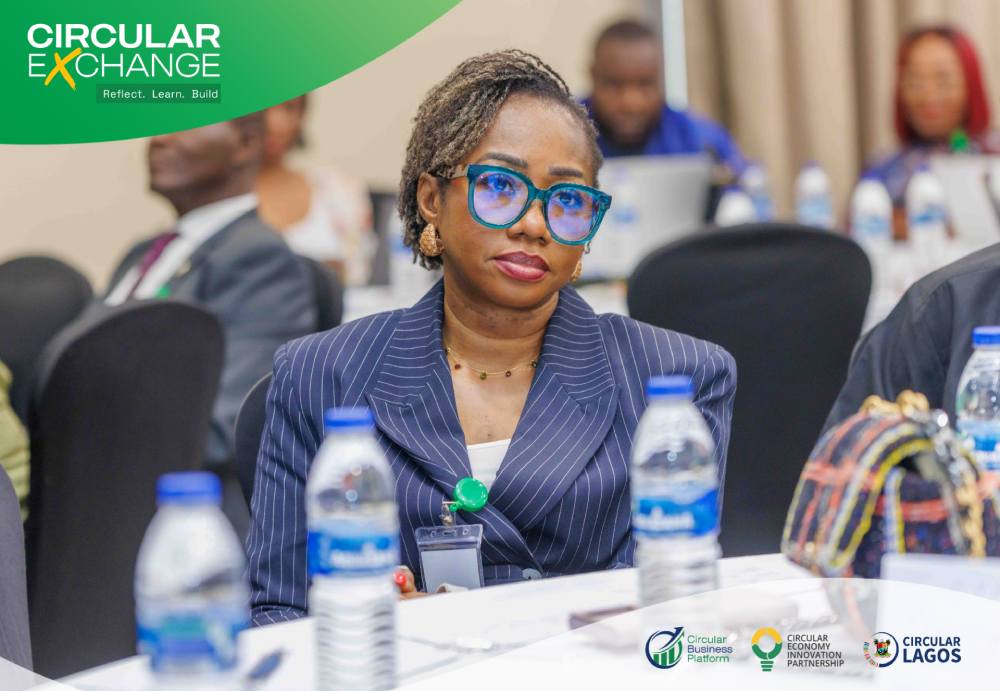

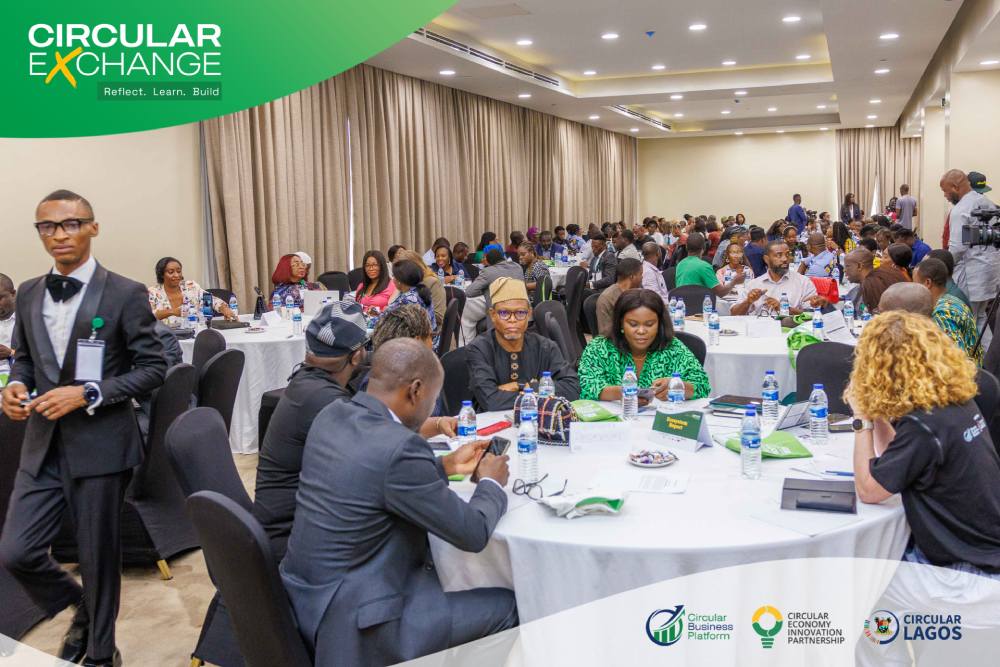
Panel Discussions
Topic: Market Debrief- How can we use Circular Procurement tools to support local innovation and entrepreneurship?
The panel moderated by Dr. Natalie Beinisch, Co-founder CEIP and Executive Secretary of the Circular Business Platform comprised: Dr. Muyiwa Gbadegesin, Managing Director LAWMA; Boluwatito Aiyepola, Specialist, Circular Economy (BASF West Africa); Dr. Adebola Odunsi, Chief Executive Officer of Integritas Limited; Victoria N. Uwadoka, Corporate Communications, Public Affairs & Sustainability Lead for Nestle Nigeria and Rita Idehai, CEO of Ecobarter.
Highlights
- We need to have collaborations for value chain development, a community or network is key to moving the circular economy.
- The circular economy industry is beginning to witness a nexus between the government and the industry. For example, the presence of a special adviser on circular economy, Public Procurement Policy of Lagos state; many agencies are beginning to adopt circular procurement, MDA’s and the ban on Styrofoam.
- Policies should be developed to foster compliance, systematic approach and advancement of the circular economy. For instance, recent ban on Styrofoam needs a policy to trigger the level of compliance to bring about the desired change
- Circular economy translates to more opportunities for jobs and management of resources; procurement for jobs profit and manage our environment properly
- Circular economy is achievable if we begin to think about our social systems and how to integrate all facets of the economy into the circular economy concept.
- Circular economy and circular procurement means closing the gap, creating new markets and de-risking to run a sustainable business.
- There is potential in reinvesting waste for energy production.
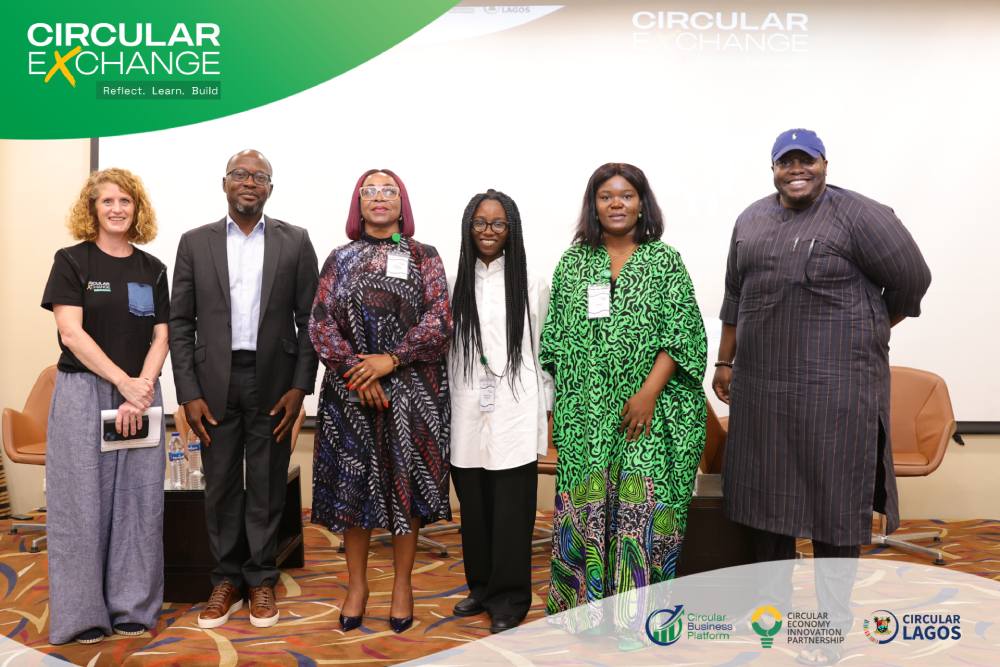
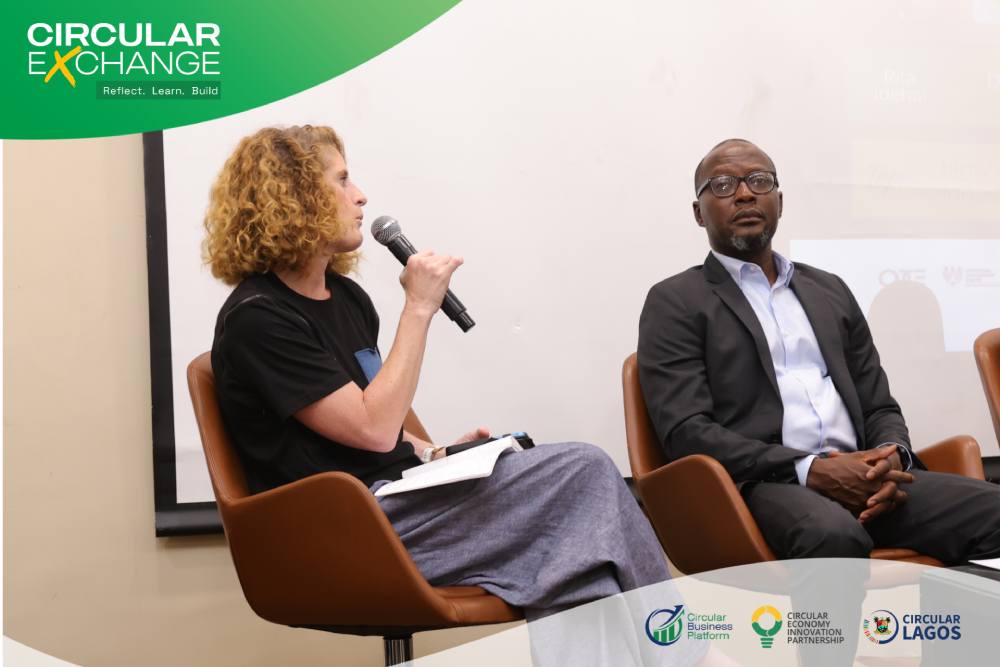

Learning Sessions
Eight learning sessions were conducted during the event, including:
- Snap Survey: How to guide master class by Circular Business Platform
- Circular Economy Metrics by Footprints Africa
- Insights on Agro-Waste by Lagos Business School
- Sustainable Construction by Innovate UK KTN (Part 1 and 2)
- Circular Business Models by Jonathan Ikeolumba, Finance & Sustainability Consultant Doctoral Researcher on Sustainability & Finance, EDC
- Investment paper by CBP/Policy implementation by Circular Business Platform
- Advancing a Circular Economy for Plastics in Nigeria by NPAP
Circular Marketplace Exhibition
Aligned with one of the key objectives of Circular Exchange 2024, the Circular Marketplace Exhibition is dedicated to advancing circular procurement. To facilitate this, each guest received chips valued at three thousand naira each, accompanied by a voting card. These tokens encouraged guests to engage in purchasing circular products amounting to at least the provided value and to cast their votes for the most innovative circular business. With over 20 participating circular business owners, the marketplace provided a diverse array of sustainable options for attendees to explore and support.
Three awards were presented at the Circular Marketplace Exhibition to three circular businesses who distinguished themselves at the event:
- Franuel Eco Furniture -Creativity in Marketing Award
- Lady Bamboo –Top Sales Performance Award
- Azach Ng –Customer Centricity Award

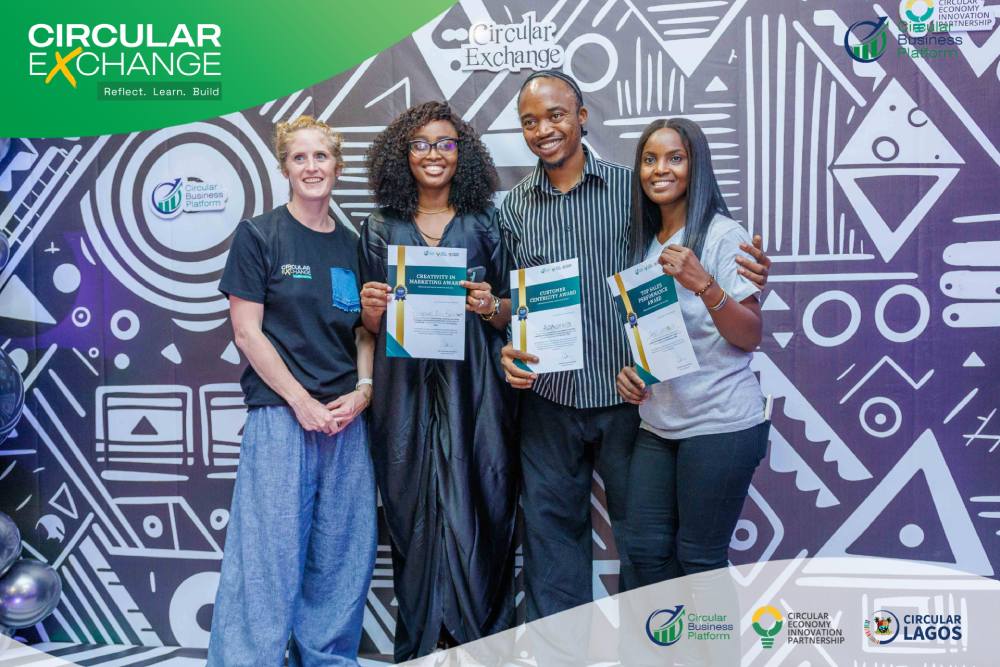
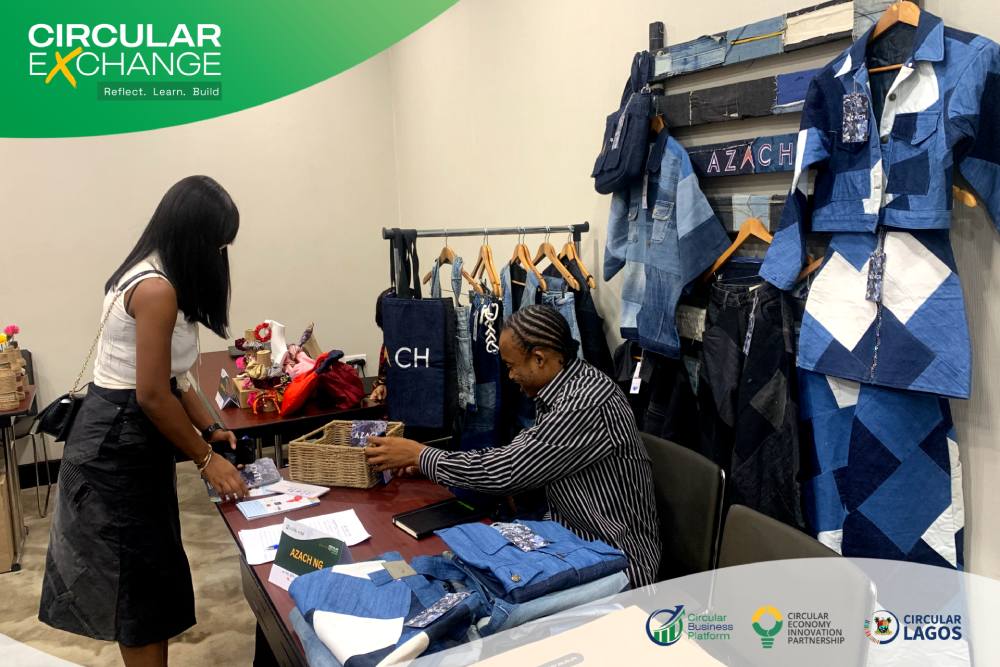
As the circular economy gains traction, Circular Exchange 2024 has played a crucial role in propelling conversations, fostering partnerships, and acknowledging the transformative potential of circular procurement and practices. The journey towards a more sustainable and circular future in Nigeria continues, fueled by the insights, collaborations, and commitments made at this significant event.
–Convener, Dr. Natalie Beinisch Co-founder CEIP, Executive Secretary, CBP.







